Adopting a gluten-free lifestyle can be a gateway to improved health, especially for those with celiac disease or gluten sensitivity. In line with this, the Mediterranean diet, celebrated for its heart-healthy and anti-inflammatory benefits, offers a rich tapestry of foods that align well with a gluten-free regimen. The foundation of the Mediterranean diet includes a high intake of vegetables, fruits, nuts, seeds, legumes, and healthy fats like olive oil, with moderate amounts of seafood and dairy, while traditionally relying on whole grains as a staple.
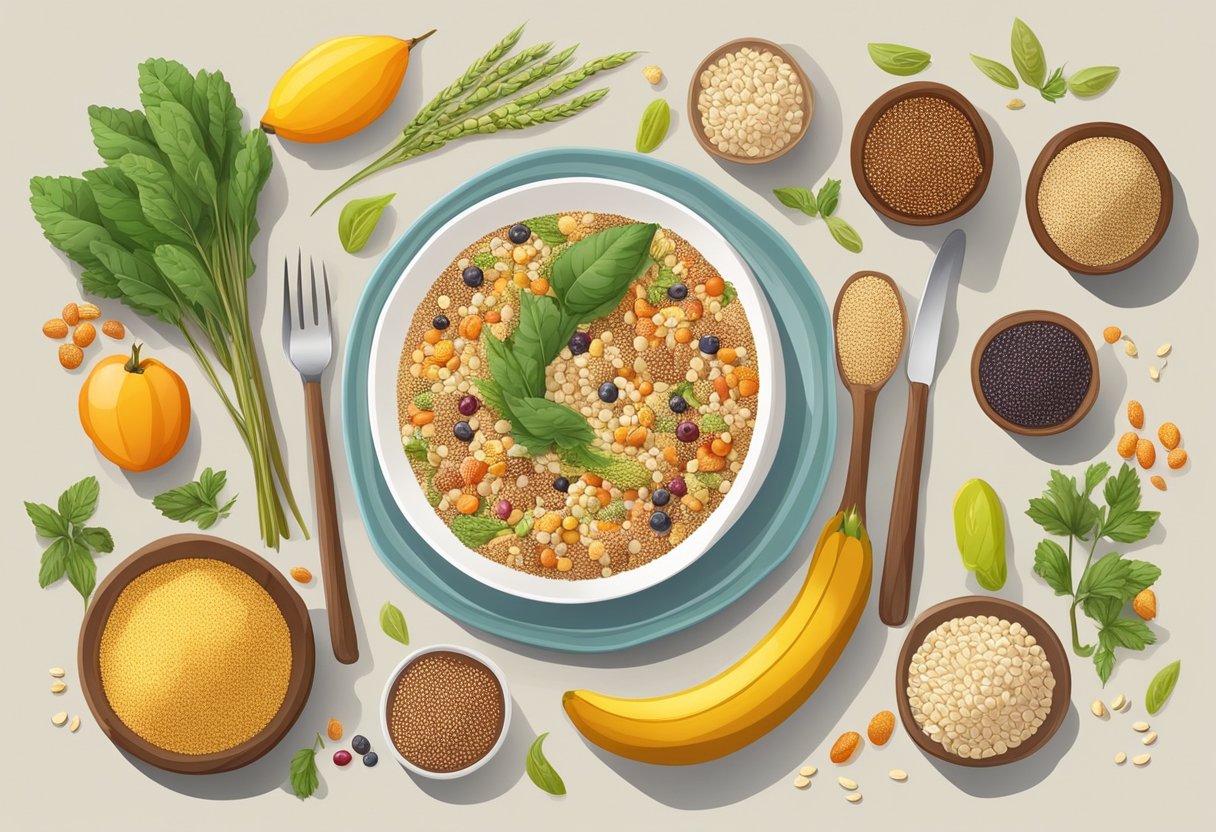
While whole grains are a central component of the Mediterranean diet, those who require a gluten-free diet must approach these staples cautiously. Fortunately, gluten-free whole grains such as buckwheat, corn, oats, rice, and quinoa fit seamlessly within the Mediterranean framework, offering nutritious alternatives without compromising the diet’s integrity or benefits. These grains can replace gluten-containing options to create balanced, nutrient-rich meals that support overall wellness.
Key Takeaways
- Adhering to a gluten-free diet is well-supported by the Mediterranean diet’s emphasis on whole foods.
- Gluten-free whole grains can easily substitute traditional grains in Mediterranean recipes.
- A gluten-free Mediterranean diet maintains the diet’s health benefits while accommodating dietary restrictions.
Table of Contents
Understanding Gluten and Celiac Disease
This section provides detailed insights into the nature of gluten, its impact on individuals with celiac disease, and the importance of gluten-free grains in the context of the Mediterranean diet.
Definition and Effects of Gluten
Gluten is a protein found in certain grains, such as wheat, rye, and barley. It acts as a binding agent, giving dough its elasticity and baked goods their structure. However, for some individuals, gluten can trigger adverse reactions. When a person with celiac disease consumes gluten, their immune system responds by attacking the lining of the small intestine. This immune reaction can cause inflammation and damage to the intestinal villi, which are crucial for nutrient absorption.
Overview of Celiac Disease and Gluten Sensitivity
Celiac disease is an autoimmune disorder where the ingestion of gluten leads to damage in the small intestine. It affects about 1 in 100 people worldwide. Symptoms can include abdominal pain, bloating, diarrhea, weight loss, and anemia. A strict, lifelong gluten-free diet is the only currently available treatment for celiac disease. This diet excludes all gluten-containing grains, making naturally gluten-free grains and grain alternatives, such as those prominent in the Mediterranean diet, highly beneficial. Foods like quinoa, millet, and rice provide health benefits without the risk associated with gluten. Gluten sensitivity, while less severe than celiac disease, also necessitates a reduction or elimination of gluten for improved health and wellbeing.
The Fundamentals of the Mediterranean Diet
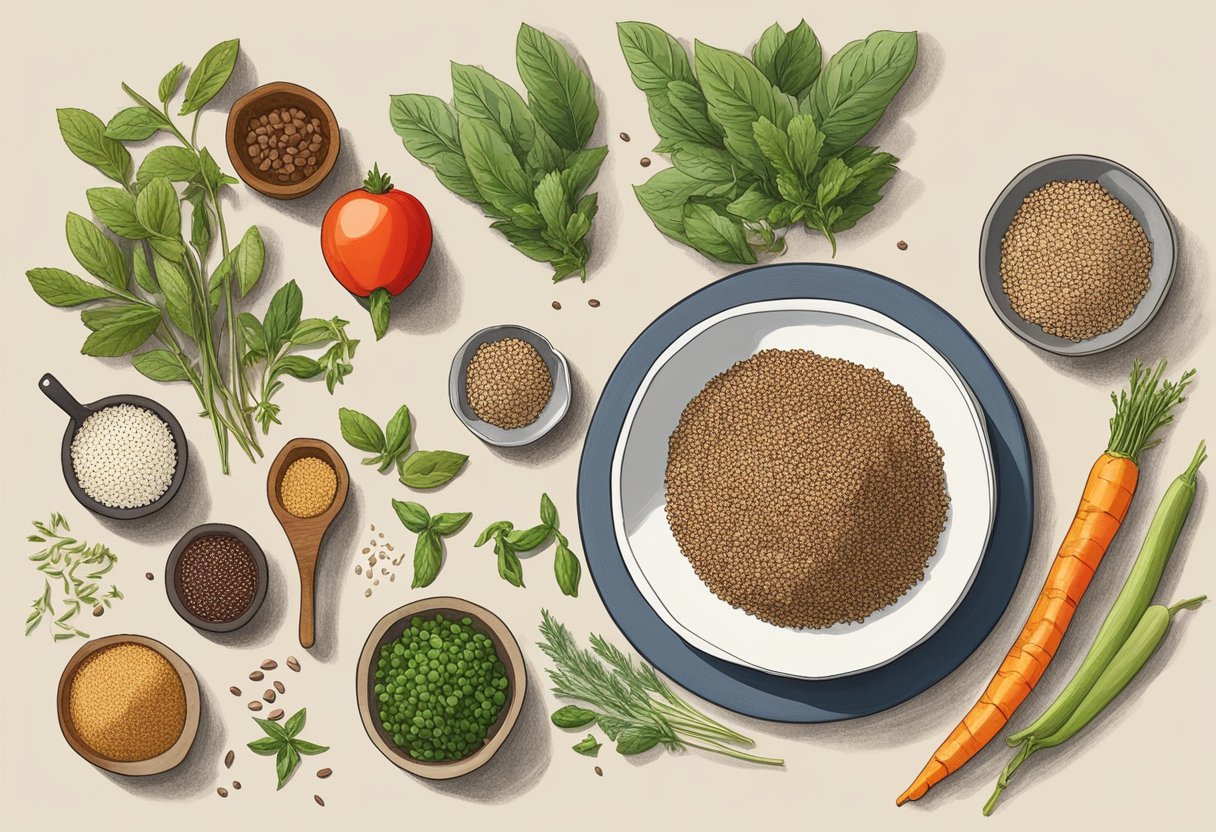
The Mediterranean Diet is renowned for its rich variety of plant-based foods, lean proteins, and healthy fats, which together form a dietary pattern that supports long-term health and well-being.
Key Components of a Traditional Mediterranean Diet
At its core, the Mediterranean Diet revolves around a few essential food groups. Vegetables and fruits are consumed in abundance, providing a range of vitamins, minerals, and fibers. Whole grains, particularly those that are gluten-free such as quinoa and brown rice, serve as a cornerstone, supplying sustained energy and additional nutrients.
Legumes like lentils and chickpeas are integral for their protein and fiber content. Traditional diets also include a variety of nuts and seeds, which contribute healthy fats and a satisfying crunch to meals. Olive oil, celebrated for its anti-inflammatory properties, is the main source of fat, enriching dishes with its monounsaturated fats.
The consumption of fish is moderate, providing a source of omega-3 fatty acids crucial for heart health. Dairy products, particularly those from goats and sheep, are eaten in moderation, while eggs appear regularly as a protein source. Though not a staple, wine is typically enjoyed in low to moderate amounts, often with meals.
Health Benefits of the Mediterranean Lifestyle
The Mediterranean Diet is well-documented for its association with a plethora of health benefits. Research indicates a reduced risk of chronic diseases such as heart disease, type 2 diabetes, and certain types of cancer. This diet’s balance of nutrients helps maintain optimal blood pressure levels and exhibits robust anti-inflammatory effects, which are key factors in reducing disease risk.
The high fiber content from plant-based foods and whole grains supports digestive health and aids in the management of blood sugar levels, critical for those with type 2 diabetes. The emphasis on healthy fats, primarily from olive oil and nuts, contributes to cardiovascular health, often leading to improvements in cholesterol profiles and heart function.
Incorporating Gluten-Free Grains into the Mediterranean Diet
The Mediterranean Diet emphasizes the consumption of a variety of whole grains. For individuals who need or choose to avoid gluten, there are many gluten-free alternatives that can be seamlessly integrated into this diet while offering nutritional advantages.
Substitutes for Traditional Gluten-Containing Grains
When adopting a gluten-free version of the Mediterranean Diet, one must consider alternative grains to staples such as wheat, barley, and rye. Quinoa, a pseudocereal with a complete protein profile, serves as an excellent substitute due to its versatility in recipes and high levels of fiber, vitamins, and minerals. Rice, both brown and wild varieties, provides a familiar texture and is also rich in nutrients and fiber.
- Buckwheat: Despite its name, buckwheat is not related to wheat and is gluten-free. It can be used in the form of groats, known as kasha, or milled into flour for baking.
- Corn: As a traditional Mediterranean staple, corn can be eaten on the cob, or used as polenta or cornmeal in various dishes.
- Oats: Although naturally gluten-free, one should choose oats that are certified gluten-free to avoid cross-contamination. Oats are a hearty grain rich in soluble fiber and can be used in porridge or baking.
In each case, replacing traditional grains with these alternatives allows individuals to maintain the dietary pattern’s integrity without gluten.
Nutritional Advantages of Gluten-Free Whole Grains
Gluten-free whole grains not only align with the Mediterranean Diet’s plant-based approach but also deliver their own set of health benefits. Fiber is abundant in grains like brown rice, quinoa, and sorghum, contributing to better digestive health and a feeling of fullness. Specific vitamins and minerals, such as B-complex vitamins, magnesium, and iron, are present in notable quantities in these grains, supporting overall health and metabolism.
- Quinoa is often highlighted for its complete amino acid profile, making it a valuable plant-based protein source.
- Rice, especially in its unrefined form, retains its nutritional value and can be a staple in a balanced gluten-free Mediterranean diet.
- Sorghum flour is gaining popularity in gluten-free recipes, and as a whole grain, it contains beneficial antioxidants among other nutrients.
By incorporating these gluten-free grains into the Mediterranean Diet, individuals can enjoy a diverse and nutritionally rich eating pattern free from gluten while still experiencing the traditional benefits of the diet such as heart health and reduced risk of chronic diseases.
Planning Gluten-Free Meals within the Mediterranean Diet
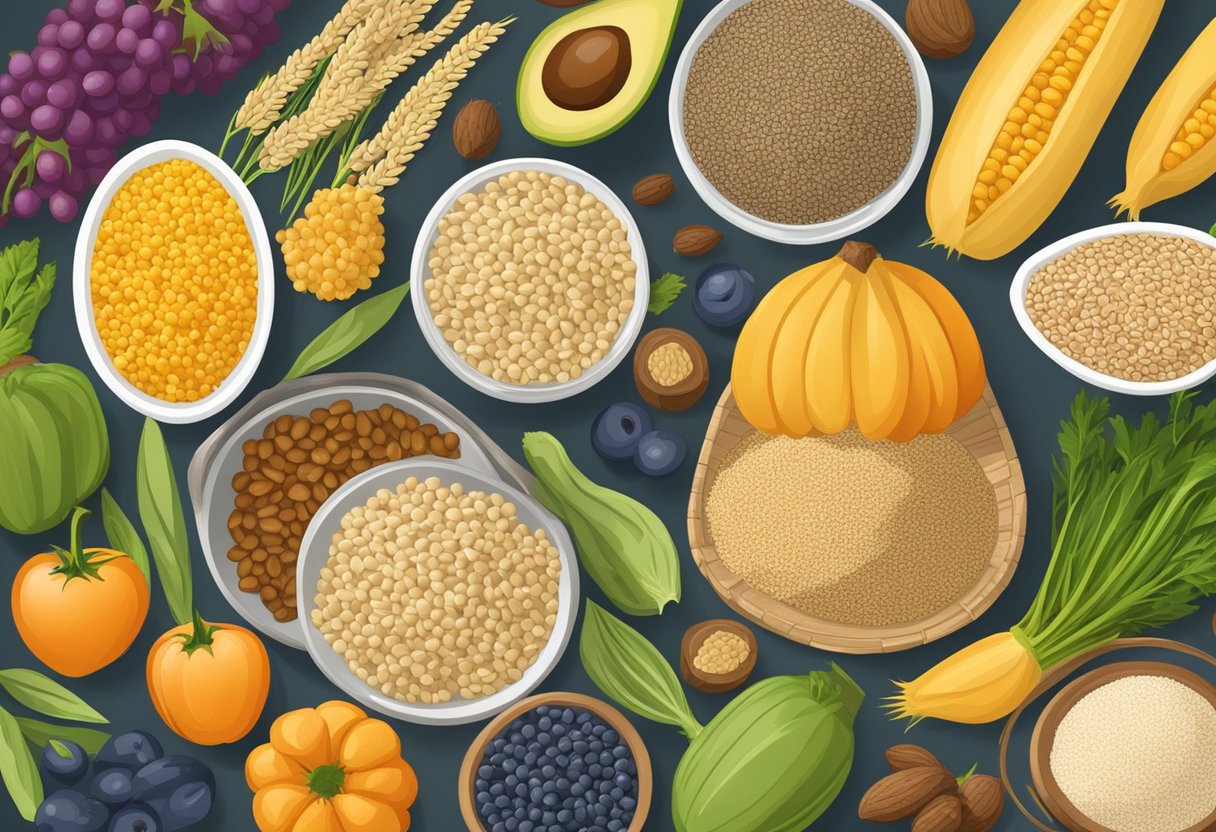
Incorporating gluten-free grains into a Mediterranean diet requires thoughtful meal planning to ensure well-rounded nutrition throughout the day. By focusing on naturally gluten-free grains and emphasizing a variety of fruits, vegetables, and lean proteins, individuals can enjoy the full benefits of this heart-healthy diet without gluten.
Breakfast Options: Starting the Day Right
For breakfast, one can begin with gluten-free oatmeal topped with a mix of berries and nuts for a fibre-rich start. Another option is a breakfast quinoa bowl, mixing cooked quinoa with sliced almonds, fresh fruit, and a drizzle of honey.
Lunch Ideas: Midday Meals to Sustain Energy
Lunch on a gluten-free Mediterranean diet might include a quinoa salad with chopped vegetables, feta cheese, and olives, dressed in olive oil and lemon. Alternatively, they can prepare a wrap using gluten-free tortillas filled with grilled chicken, a variety of vegetables, and hummus for a protein-packed meal.
Dinner Suggestions: Ending the Day with a Nutritious Feast
Dinner can feature baked fish or chicken as a lean protein source, accompanied by a side of roasted vegetables and a serving of brown rice or gluten-free pasta. For a vegetarian option, a hearty lentil stew with gluten-free cornbread can provide ample nutrients and flavour.
Gluten-Free Alternatives for Mediterranean Recipes

The inclusion of gluten-free alternatives in the Mediterranean diet allows individuals with gluten sensitivities to enjoy a variety of traditional dishes. These alternatives primarily focus on using gluten-free grains and flours in place of their gluten-containing counterparts.
Adapting Traditional Recipes to Be Gluten-Free
One can adapt traditional Mediterranean recipes to be gluten-free by substituting grains that contain gluten, such as wheat, with gluten-free whole grains like buckwheat, corn, oats, rice, and quinoa. For instance, classic pasta dishes can be altered by using pastas made from gluten-free grains or even legume-based options, as advised by some registered dietitians. Oats can replace bulgur wheat in tabbouleh to maintain the integrity of the dish while adhering to a gluten-free diet.
Creative Use of Gluten-Free Flours and Grains in Cooking
Gluten-free flours, such as rice, almond, and chickpea flours, enable one to recreate beloved breads and pastas within a gluten-free Mediterranean meal plan. These flours can also be blended to develop bread with appealing textures and flavors that complement Mediterranean cuisine. Gluten-free Greek recipes often utilize creative flour combinations to create delicious versions of pita bread—essential for a complete Mediterranean experience. With these substitutions, individuals can enjoy a myriad of gluten-free Mediterranean recipes without sacrificing taste or nutritional value.
Considerations for a Healthy Gluten-Free Mediterranean Diet
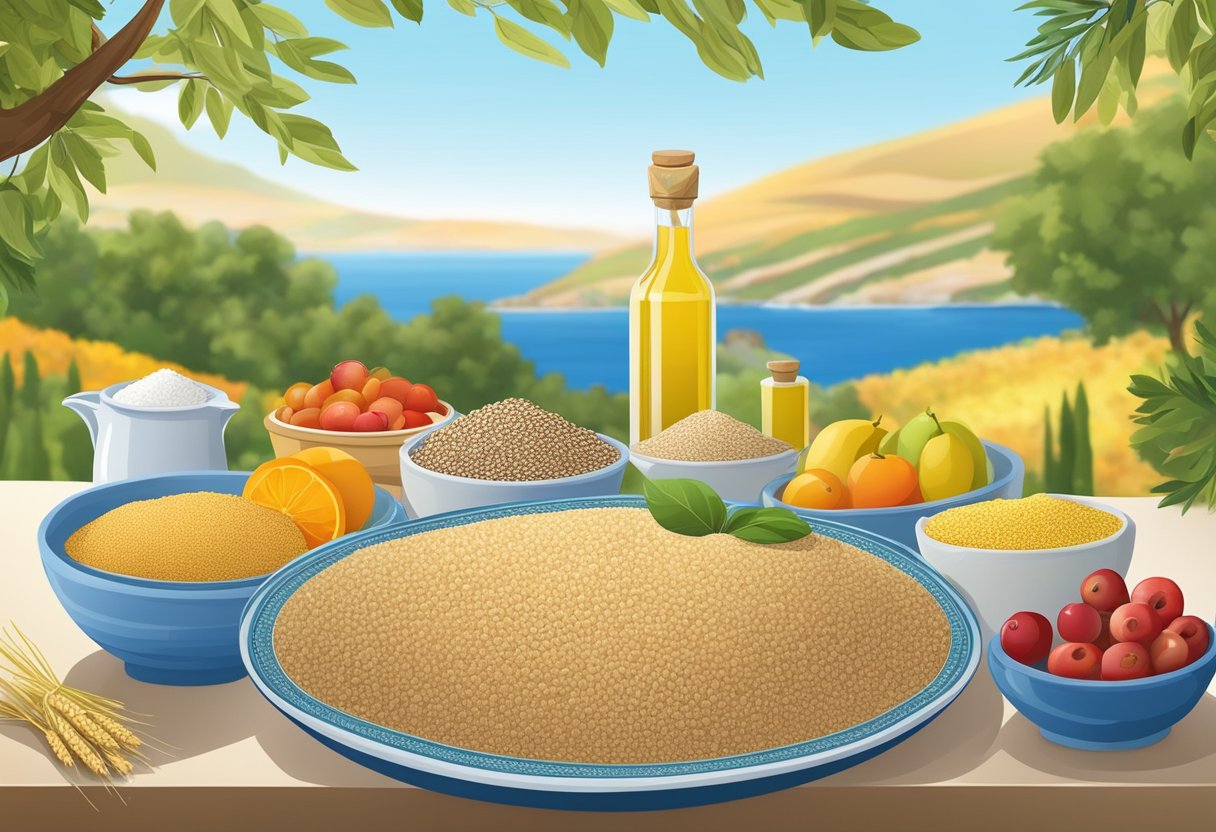
When adopting a gluten-free Mediterranean diet, individuals should focus on maintaining a balance of nutrients and ensuring that cross-contamination with gluten is avoided to meet their dietary needs effectively.
Maintaining Nutritional Balance and Variety
A balanced gluten-free Mediterranean diet should emphasize whole foods, offering a broad spectrum of essential nutrients to support overall health. Individuals should incorporate a variety of gluten-free grains like quinoa, rice, and buckwheat, which align with Mediterranean dietary patterns. Including ample fruits, vegetables, legumes, nuts, seeds, and lean proteins like fish and poultry also helps ensure a well-rounded intake of vitamins, minerals, and fiber. The Celiac Disease Foundation advocates for a diverse intake of whole foods to prevent nutritional deficiencies and support maturation and long-term health in individuals with celiac disease.
Avoiding Cross-Contamination with Gluten
Preventing cross-contamination is crucial for those on a gluten-free diet, particularly for individuals with celiac disease, where even trace amounts of gluten can trigger adverse reactions. In their kitchen practices, they must maintain accuracy and vigilance. This includes using separate cooking surfaces and utensils for gluten-free foods, thorough cleaning of kitchen areas, and checking for gluten in food labels and ingredients lists. An understanding of how foods are processed and awareness of potential sources of gluten helps safeguard their dietary needs against contamination.
Additional Health Considerations and Benefits
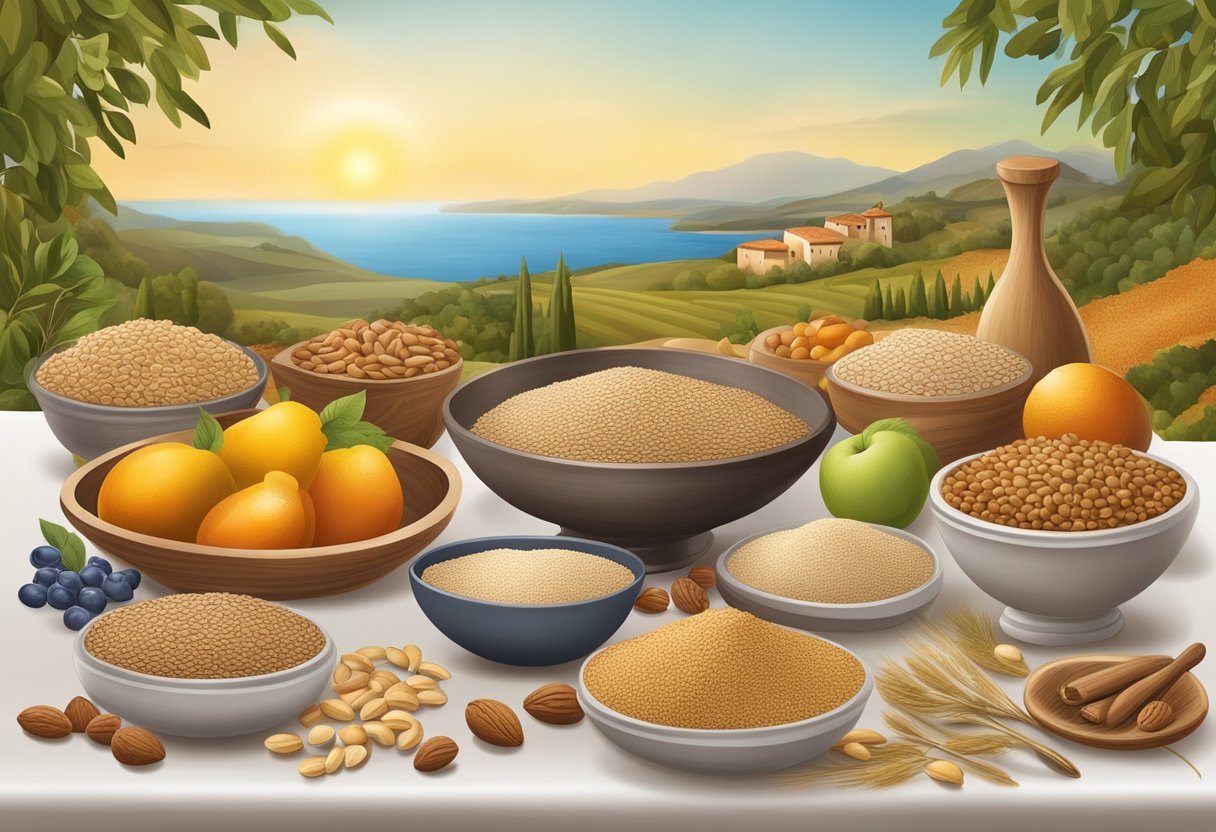
Incorporating gluten-free grains into a Mediterranean diet enhances its overall health benefits substantially, particularly for individuals managing certain chronic diseases and looking to improve metabolic health.
Impact on Chronic Diseases and Conditions
Activities such as eating a diet rich in gluten-free grains can be a powerful intervention for cardiovascular health. They often contain abundant fiber, which is linked to lower levels of bad LDL cholesterol and a reduced risk of developing heart disease. Studies have also pointed to the Mediterranean diet’s ability to keep blood sugar levels stable, offering benefits for those with diabetes. Additionally, anti-inflammatory properties of many foods in this diet may be beneficial to individuals managing or at risk for Alzheimer’s disease.
Role in Weight Management and Metabolic Health
The gluten-free Mediterranean diet often focuses on low-fat and plant-based foods, which can aid in weight management. It contains balanced portions of healthy fats, such as olive oil and nuts, which contribute to satiety and help prevent overeating. This way of eating can also be effective in combatting metabolic syndrome, as its emphasis on whole foods and lean proteins helps maintain a healthy metabolism. The natural anti-inflammatory effects of this diet contribute to its promotion of overall health.
Frequently Asked Questions
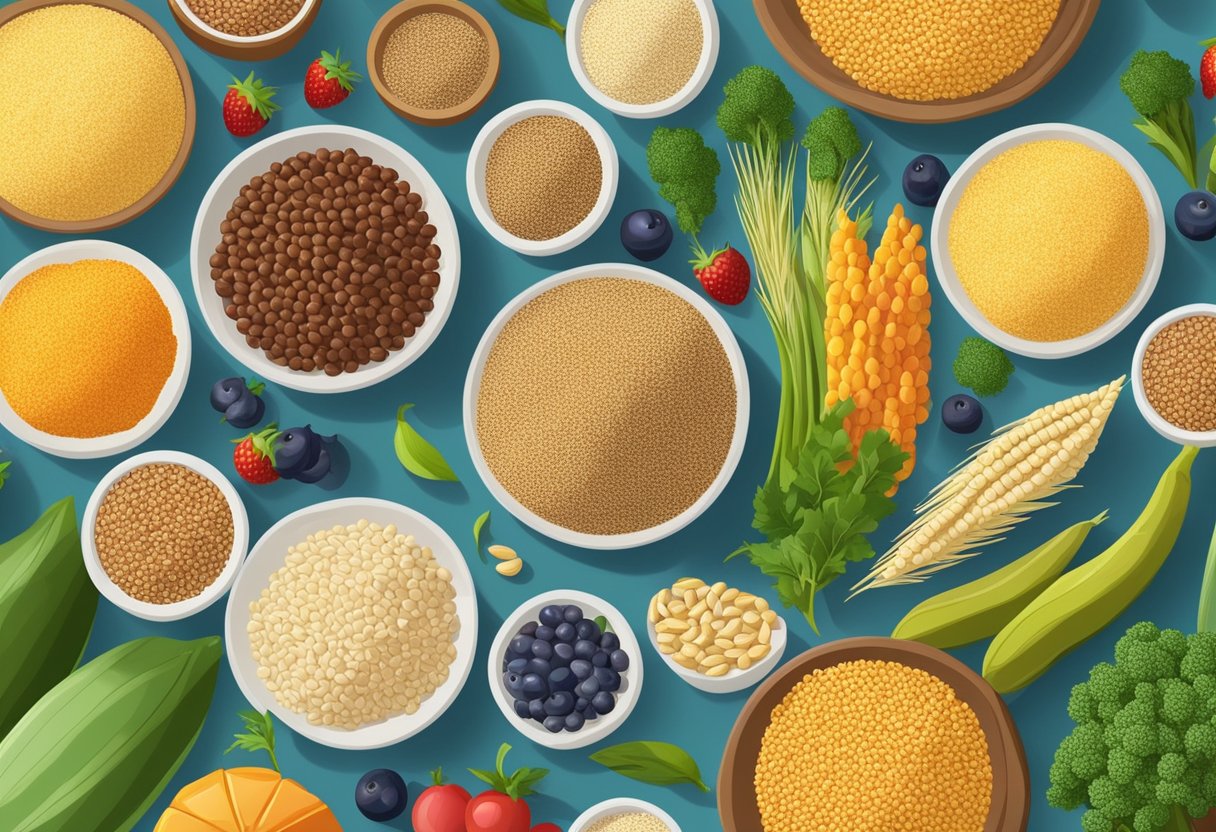
Exploring a gluten-free Mediterranean diet requires understanding the grains that fit within its guidelines and how to incorporate them into meals.
What are some suitable gluten-free grain options for someone following the Mediterranean diet?
Individuals may opt for grains such as brown rice, millet, teff, and buckwheat. These grains complement the nutritional profile of the Mediterranean diet by providing fiber, vitamins, and minerals.
Can quinoa, a gluten-free grain, be incorporated into the Mediterranean diet effectively?
Yes, quinoa can be incorporated into the Mediterranean diet. It is rich in protein and essential amino acids and serves as a versatile base for salads, as a side dish, or even as a breakfast cereal.
Where can I find gluten-free Mediterranean diet-friendly breakfast recipes?
For a variety of recipes, one might visit the Celiac Disease Foundation’s website, which offers a gluten-free meal plan including breakfast options that are suitable for a Mediterranean diet.
Are there specific gluten-free pasta types recommended for a Mediterranean diet plan?
Corn, rice, quinoa, and legume-based pastas are all recommended gluten-free alternatives. These can be used in traditional Mediterranean dishes, such as pasta salads with olive oil, garlic, and fresh vegetables.
How can I identify anti-inflammatory gluten-free grains suitable for the Mediterranean diet?
Look for whole grains that are naturally gluten-free, such as sorghum and amaranth, which have anti-inflammatory properties and can support the heart-healthy fats prevalent in the Mediterranean diet.
What items should I include on a gluten-free Mediterranean diet shopping list?
A shopping list could include gluten-free whole grains, a variety of fruits and vegetables, legumes, nuts, seeds, herbs, spices, and healthy fats like olive oil. Fresh fish and seafood can be added for protein.



